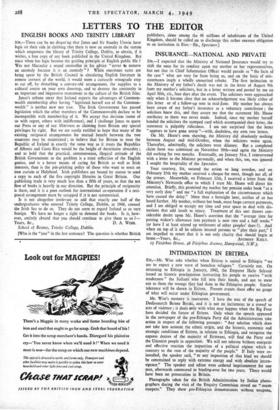LETTERS TO THE EDITOR
ENGLISH BOOKS AND TRINITY LIBRARY
Snt,—There can be no dispuing that Janus and Sir Stanley Unwin have logic on their side in claiming that there is now an anomaly in the statute which empowers the library of Trinity College, Dublin, to obtain, if it wishes, a free copy of any book published in the United,Kingdom. But since when has logic become the guiding principle of English public life ? Was not Macaulay a sound counsellor in his advice "never to remove an anomaly because it is an anomaly " ? When enormous sums are being spent by the British Council in circulating English literature in remote corners of the world, it would seem a curiously retrograde step to cut off, by disturbing a century-old arrangement, the supplies to a cultural centre on your own doorstep, and to destroy the continuity in an important and impressive monument to the culture of the British Isles.
Janus's urbane sneer that Ireland expects the advantages of Common- wealth membership after having " legislated herself out of the Common- wealth " is neither new nor true. The Irish Government has passed legislation which the other members of the Commonwealth declare to be incompatible with membership of it. We accept that decision (some of us with regret, others with indifference), and I challenge Janus to quote our Press or any of our Ministers as claiming from Britain any special privileges by right. But we are surely entitled to hope that many of the existing reciprocal arrangements for mutual benefit between the two countries may be maintained ; to believe that for Britain to treat the Republic of Ireland in exactly the same way as it treats the Republics of Albania and Costa Rica would be the height of doctrinaire absurdity ; and to hold that the practical, commonsense, illogical attitude of the British Government to the problem is a truer reflection of the English genius, and is a better means of caring for British as well as Irish interests, than is the pin-pricking policy of those who want to erect an iron curtain at Holyhead. Irish publishers are bound by statute to send a copy to each of the five copyright libraries in Great Britain. Our publishing trade is very much less than a fifth of yours, so that the net flow of books is heavily in our direction. But the principle of reciprocity is there, and it is a poor outlook for international co-operation if a reci- procal arrangement must be scrapped if it is not symmetrical.
It is not altogether irrelevant to add that exactly one half of the undergraduates who entered Trinity College, Dublin, in 1948, crossed the Irish Sea to do so. They do not seem to regard Ireland as so very foreign. We have no longer a right to demand the books. Is it, how- ever, entirely absurd that you should continue to give them to us ?-
Yours, &c., D. A. WEBB. School of Botany, Trinity College, Dublin.
[Who is the "you" in the last sentence? The question is whether British
publishers, alone among the 48 millions of inhabitants of the United Kingdom, should be called on to discharge this rather onerous obligation to an institution in Eire.—En., Spectator.]






































 Previous page
Previous page